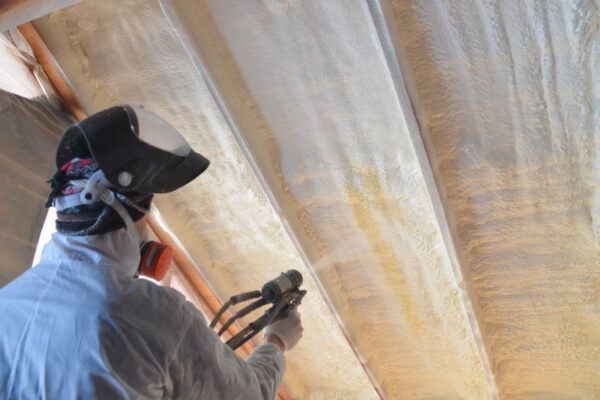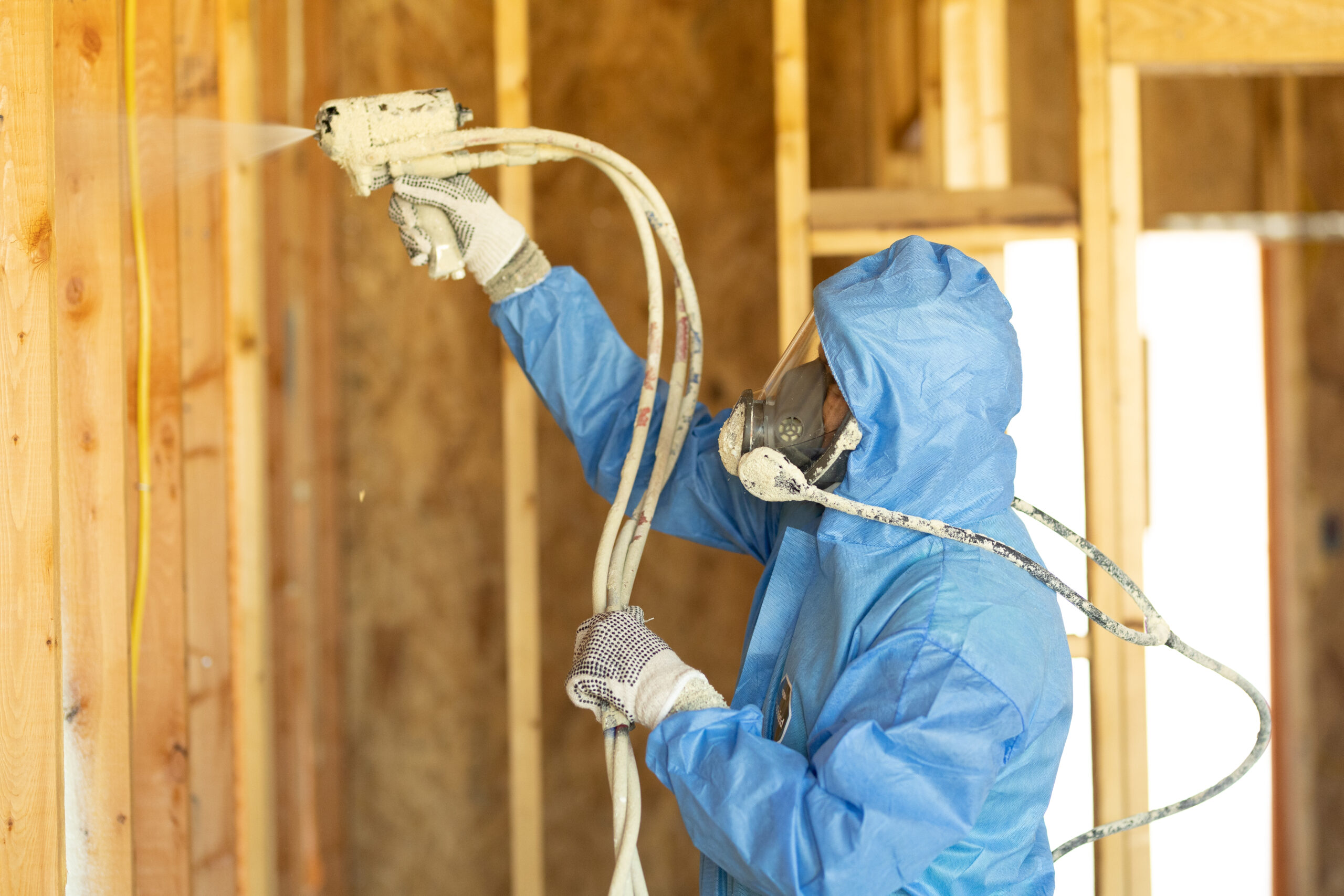How Spray Foam Can Improve Energy Effectiveness in your house
How Spray Foam Can Improve Energy Effectiveness in your house
Blog Article
How Spray Foam Can Enhance Energy Effectiveness in Any Kind Of Building
Spray foam insulation has emerged as a pivotal solution for enhancing energy efficiency across numerous building types. By developing an airtight seal that minimizes air leakage, it efficiently regulates indoor environments while considerably lowering heating & cooling costs. Additionally, its excellent R-value and moisture-resistant residential properties add to lasting power cost savings and boosted building durability. As home owners progressively seek sustainable services, the implications of spray foam insulation extend beyond mere energy savings. The full scope of its benefits, nonetheless, warrants a more detailed examination of exactly how it can transform power management techniques in both industrial and domestic setups.
Understanding Spray Foam Insulation
Spray foam insulation is progressively recognized for its remarkable thermal efficiency and convenience in numerous applications. Composed primarily of polyurethane, this insulation material is applied as a fluid that expands upon call, loading gaps and creating a seamless obstacle. This unique residential or commercial property allows spray foam to adapt uneven surfaces, making it an excellent selection for both commercial and household structures.

Application of spray foam insulation is generally performed by experienced specialists making use of specific equipment, making sure optimum efficiency and safety and security - Spray Foam. The curing process is fast, enabling fast installation and marginal disturbance. As a result, spray foam insulation is progressively being employed in brand-new construction and retrofitting projects due to its ability to enhance structural integrity while boosting total power effectiveness in structures
Benefits of Energy Efficiency
Power performance plays a critical function in decreasing functional costs and decreasing ecological influence across various fields. By enhancing energy use, businesses and property owners can achieve significant savings on energy expenses, which straight enhances economic efficiency. Efficient energy usage means less reliance on nonrenewable fuel sources, thereby adding to a reduction in greenhouse gas exhausts and promoting an extra lasting environment.
In addition, energy-efficient buildings often experience boosted residential or commercial property worths. As energy costs climb and sustainability becomes a top priority for consumers, residential properties with enhanced energy efficiency attributes are a lot more attractive on the market. This trend encourages financial investment in energy-saving modern technologies, which can better drive development and economic development.
Along with ecological and monetary advantages, energy effectiveness can likewise boost the overall comfort and health of interior rooms. Appropriate insulation and effective cooling and heating systems assist maintain constant temperature levels, reducing drafts and moisture degrees, which consequently can lead to better indoor air high quality.
Inevitably, the advantages of energy effectiveness prolong beyond immediate financial savings, cultivating a resilient economic climate, advertising ecological stewardship, and boosting the lifestyle for residents in any kind of building.
How Spray Foam Functions
Generally applied as a fluid, spray foam broadens rapidly upon contact with surface areas, creating a solid obstacle that efficiently secures fractures and spaces. This unique residential property results from its chemical composition, mostly containing isocyanates and polyols, which react when blended to produce a foam that adheres and fills up spaces to numerous materials, consisting of timber, concrete, and metal.
As soon as applied, the foam broadens to numerous times its initial volume, making certain a limited seal that protects against air leakage. This procedure considerably lowers thermal linking, which happens when warmth transfers via products, leading to power loss. The foam's high R-value, a measure of thermal resistance, adds to boosted insulation by minimizing warmth transfer between the exterior and interior atmospheres.
Furthermore, spray foam is resistant to wetness and parasites, better enhancing its efficiency in preserving power performance. Its application can be customized to different locations, consisting of attic rooms, walls, and crawl rooms, enhancing insulation throughout a building. Spray Foam. In general, the innovative style and application approach of spray foam make it an effective option for boosting energy efficiency in any type of framework, causing decreased power prices and a much more lasting constructed atmosphere

Applications in Numerous Buildings
Various applications of spray foam insulation can be discovered throughout various building types, improving energy performance and comfort. In household homes, spray foam is usually made use of in attics and wall surfaces to develop a seamless obstacle versus air leakages, substantially reducing home heating and cooling down demands. This application is especially advantageous in older homes, where traditional insulation may be poor.
In business buildings, spray foam insulation is applied to roof covering systems and exterior wall surfaces, which aids to boost thermal efficiency and shield versus moisture breach. Its light-weight nature makes it an excellent selection for retrofitting existing frameworks without including significant weight. Furthermore, spray foam can be used in industrial settings to shield pipes and tank, keeping temperature level control for delicate materials.
Institutional buildings, such as institutions and medical facilities, take advantage of spray foam insulation by ensuring a regular interior climate that sustains occupant comfort and health and wellness. The convenience of spray foam allows over here it to adapt to different structure shapes and sizes, making it a recommended choice for engineers and builders seeking reliable insulation services. Overall, spray foam insulation acts as a vital component in achieving energy-efficient buildings throughout all industries.
Long-Term Expense Financial Savings
Spray foam insulation uses significant long-term price financial savings for building owners and owners by minimizing energy consumption and lowering energy bills. By giving a superior air seal, spray foam decreases the seepage of outdoors air, thereby boosting the thermal look these up performance of a building. This causes a lot more effective heating and cooling procedures, which can result in substantial reductions in energy expenses with time.
Along with instant cost savings on utility expenses, the longevity and longevity of spray foam insulation contribute to its economic benefits. Unlike traditional insulation products, which may sag, work out, or weaken, spray foam keeps its effectiveness for decades, lowering the demand for constant replacements or repair services. This durability translates to lower upkeep prices and much less interruption for passengers.
Additionally, structures geared up with spray foam insulation usually appreciate a boost in property value, making them extra attractive to potential purchasers or tenants. As power performance becomes significantly prioritized, homes with efficient insulation services stand out in the marketplace. Inevitably, the integration of spray foam insulation not only boosts convenience however additionally represents a calculated investment that generates significant financial benefits over the long-term.
Verdict
To conclude, spray foam insulation serves as an important part in improving power efficiency throughout varied building kinds. Its ability to produce a smooth barrier versus air leak, incorporated with high R-values and moisture-resistant residential properties, substantially reduces energy usage and linked prices. The execution of spray foam not just contributes to consistent interior temperature levels yet also enhances building worth, continue reading this highlighting its role as a prudent investment for both business and residential properties.
Spray foam insulation has actually arised as a critical option for improving energy efficiency across various structure types. Spray Foam. As a result, spray foam insulation is progressively being employed in brand-new building and retrofitting projects due to its capacity to boost architectural integrity while enhancing total power efficiency in structures
In general, the innovative design and application approach of spray foam make it an efficient service for enhancing power efficiency in any kind of framework, leading to reduced power expenses and an extra lasting constructed setting.
Various applications of spray foam insulation can be located across different structure types, enhancing energy performance and comfort.In verdict, spray foam insulation offers as an important component in enhancing energy efficiency throughout diverse building types.
Report this page